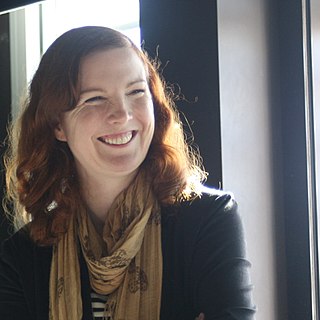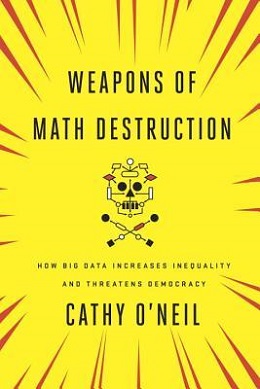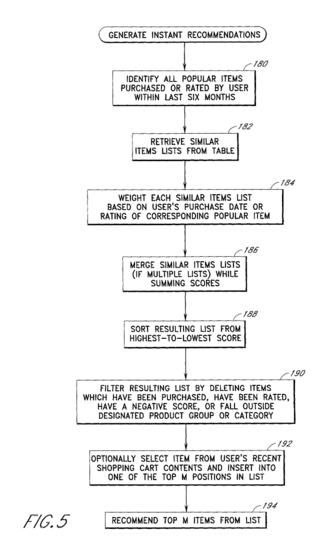
Kate Crawford is a researcher, writer, composer, producer and academic, who studies the social and political implications of artificial intelligence. She is based in New York and works as a principal researcher at Microsoft Research, the co-founder and former director of research at the AI Now Institute at NYU, a visiting professor at the MIT Center for Civic Media, a senior fellow at the Information Law Institute at NYU, and an associate professor in the Journalism and Media Research Centre at the University of New South Wales. She is also a member of the WEF's Global Agenda Council on Data-Driven Development.

Legal technology, also known as Legal Tech, refers to the use of technology and software to provide legal services and support the legal industry. Legal Tech companies are often startups founded with the purpose of disrupting the traditionally conservative legal market.
The Scientific Charity Movement was a movement that arose in the early 1870s in the United States to stop poverty. It sought to move the role of supporting the impoverished away from government and religious organizations and into the hands of Charity Organization Societies (COS). These Societies claimed the altruistic goals of lifting the poor out of poverty through the means of education and employment, and did make some strides to help young children involved in immoral underaged labor practices. However, when it came to the COS's treatment of the "defective class" as they were labeled, the Scientific Charity Movement's other goals based in the popular post civil war social scientific theories of eugenics and social Darwinism came to light. Many of these "defective classes" were moved from the streets and into insane asylums where they were often experimented on by scientists of the time.

Ruha Benjamin is a sociologist and a professor in the Department of African American Studies at Princeton University. The primary focus of her work is the relationship between innovation and equity, particularly the intersection of race, justice, and technology. Benjamin is the author of numerous publications, including the books People's Science: Bodies and Rights on the Stem Cell Frontier (2013), Race After Technology: Abolitionist Tools for the New Jim Code (2019), and Viral Justice: How We Grow the World We Want (2022).

Weapons of Math Destruction is a 2016 American book about the societal impact of algorithms, written by Cathy O'Neil. It explores how some big data algorithms are increasingly used in ways that reinforce preexisting inequality. It was longlisted for the 2016 National Book Award for Nonfiction but did not make it through the shortlist. The book has been widely reviewed, and won the Euler Book Prize.

Algorithmic bias describes systematic and repeatable errors in a computer system that create "unfair" outcomes, such as "privileging" one category over another in ways different from the intended function of the algorithm.

Algorithms of Oppression: How Search Engines Reinforce Racism is a 2018 book by Safiya Umoja Noble in the fields of information science, machine learning, and human-computer interaction.

Meredith Broussard is a data journalism professor at the Arthur L. Carter Journalism Institute at New York University. Her research focuses on the role of artificial intelligence in journalism.

Joy Adowaa Buolamwini is a Canadian-American computer scientist and digital activist formerly based at the MIT Media Lab. She founded the Algorithmic Justice League (AJL), an organization that works to challenge bias in decision-making software, using art, advocacy, and research to highlight the social implications and harms of artificial intelligence (AI).

Safiya Umoja Noble is the David O. Sears Presidential Endowed Chair of Social Sciences and Professor of Gender Studies, African American Studies, and Information Studies at the University of California, Los Angeles. She is the director of the UCLA Center on Race & Digital Justice and co-director of the Minderoo Initiative on Tech & Power at the UCLA Center for Critical Internet Inquiry (C2i2). She serves as interim director of the UCLA DataX Initiative, leading work in critical data studies.

Meredith Whittaker is the president of the Signal Foundation and serves on its board of directors. She was formerly the Minderoo Research Professor at New York University (NYU), and the co-founder and faculty director of the AI Now Institute. She also served as a senior advisor on AI to Chair Lina Khan at the Federal Trade Commission. Whittaker was employed at Google for 13 years, where she founded Google's Open Research group and co-founded the M-Lab. In 2018, she was a core organizer of the Google Walkouts and resigned from the company in July 2019.

Julia Angwin is an American investigative journalist, author, and entrepreneur. She co-founded and was editor-in-chief of The Markup, a nonprofit newsroom that investigates the impact of technology on society. She was a staff reporter at the New York bureau of The Wall Street Journal from 2000 to 2013, during which time she was on a team that won the Pulitzer Prize in journalism. She worked as a senior reporter at ProPublica from 2014 to April 2018, during which time she was a finalist for the Pulitzer Prize.
Government by algorithm is an alternative form of government or social ordering where the usage of computer algorithms is applied to regulations, law enforcement, and generally any aspect of everyday life such as transportation or land registration. The term "government by algorithm" has appeared in academic literature as an alternative for "algorithmic governance" in 2013. A related term, algorithmic regulation, is defined as setting the standard, monitoring and modifying behaviour by means of computational algorithms – automation of judiciary is in its scope. In the context of blockchain, it is also known as blockchain governance.

Coded Bias is an American documentary film directed by Shalini Kantayya that premiered at the 2020 Sundance Film Festival. The film includes contributions from researchers Joy Buolamwini, Deborah Raji, Meredith Broussard, Cathy O’Neil, Zeynep Tufekci, Safiya Noble, Timnit Gebru, Virginia Eubanks, and Silkie Carlo, and others.

The Algorithmic Justice League (AJL) is a digital advocacy non-profit organization based in Cambridge, Massachusetts. Founded in 2016 by computer scientist Joy Buolamwini, the AJL uses research, artwork, and policy advocacy to increase societal awareness regarding the use of artificial intelligence (AI) in society and the harms and biases that AI can pose to society. The AJL has engaged in a variety of open online seminars, media appearances, and tech advocacy initiatives to communicate information about bias in AI systems and promote industry and government action to mitigate against the creation and deployment of biased AI systems. In 2021, Fast Company named AJL as one of the 10 most innovative AI companies in the world.

Rashida Richardson is a visiting scholar at Rutgers Law School and the Rutgers Institute for Information Policy and the Law and an attorney advisor to the Federal Trade Commission. She is also an assistant professor of law and political science at the Northeastern University School of Law and the Northeastern University Department of Political Science in the College of Social Sciences and Humanities.

Tawana Petty is an American author, poet, social justice organizer, mother and youth advocate who works to counter systemic racism. Petty formerly served as Director of Policy and Advocacy for the Algorithmic Justice League representing AJL in national and international processes shaping AI governance.
Credit scoring systems in the United States have garnered considerable criticism from various media outlets, consumer law organizations, government officials, debtors unions, and academics. Racial bias, discrimination against prospective employees, discrimination against medical and student debt holders, poor risk predictability, manipulation of credit scoring algorithms, inaccurate reports, and overall immorality are some of the concerns raised regarding the system. Danielle Citron and Frank Pasquale list three major flaws in the current credit-scoring system:
- Disparate impacts: The algorithms systematize biases that have been measured externally and are known to impact disadvantaged groups such as racial minorities and women. Because the algorithms are proprietary, they cannot be tested for built-in human bias.
- Arbitrary: Research shows that there is substantial variation in scoring based on audits. Responsible financial behavior can be penalized.
- Opacity: credit score technology is not transparent so consumers are unable to know why their credit scores are affected.
Automated decision-making (ADM) involves the use of data, machines and algorithms to make decisions in a range of contexts, including public administration, business, health, education, law, employment, transport, media and entertainment, with varying degrees of human oversight or intervention. ADM involves large-scale data from a range of sources, such as databases, text, social media, sensors, images or speech, that is processed using various technologies including computer software, algorithms, machine learning, natural language processing, artificial intelligence, augmented intelligence and robotics. The increasing use of automated decision-making systems (ADMS) across a range of contexts presents many benefits and challenges to human society requiring consideration of the technical, legal, ethical, societal, educational, economic and health consequences.
Automating Inequality: How High-Tech Tools Profile, Police, and Punish the Poor is a book by Virginia Eubanks.
















